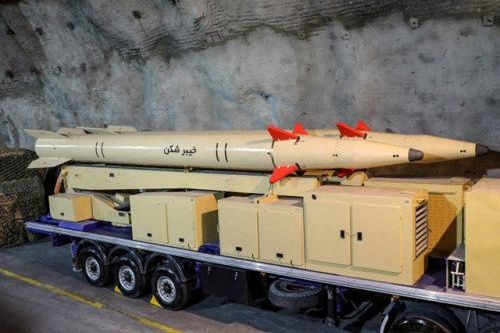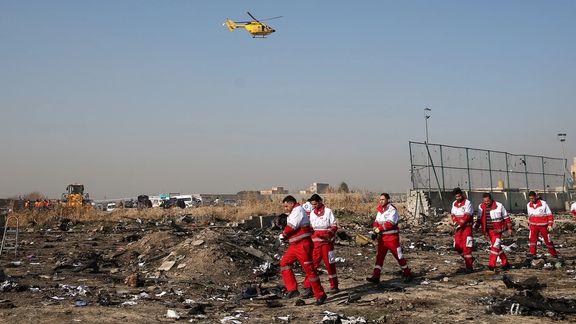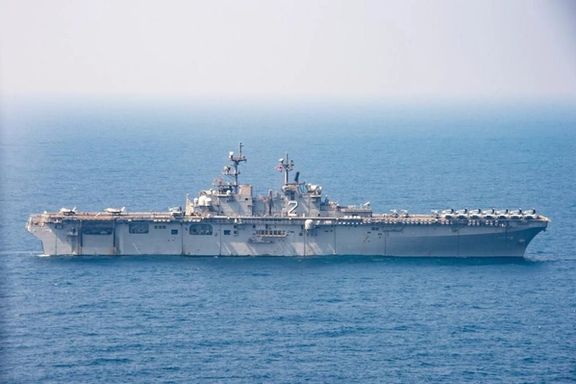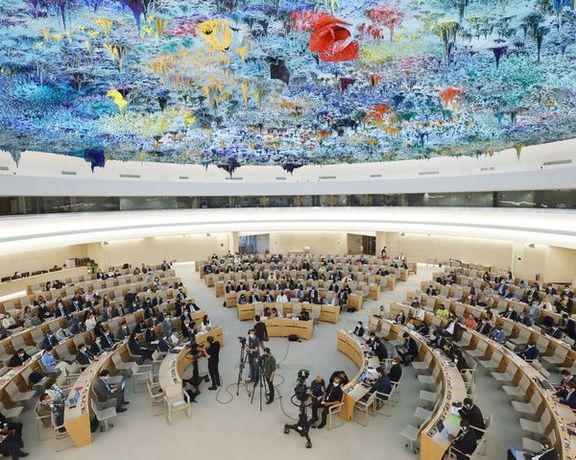E3 Weigh Extension Of Sanctions On Iran's Missile Program

France, Britain and Germany are discussing how to deal with the approaching expiration of European Union sanctions against the Islamic Republic's ballistic missile program.

France, Britain and Germany are discussing how to deal with the approaching expiration of European Union sanctions against the Islamic Republic's ballistic missile program.
Speaking exclusively to Iran International, German Foreign Ministry Spokesperson Christian Wagner said: "We are in touch with our E3 partners [France and Britain] on how to deal with the issue of Iran," when asked about the possible extension of sanctions on Iran's ballistic missile program.
Set to expire in October under the 2015 nuclear deal, the sanctions have as yet failed to stall Iran's nuclear progress. Wagner said the Islamic Republic has developed its nuclear program in recent months in violation of its commitment under the Joint Comprehensive Plan of Action (JCPOA).
"As parties to the JCPOA and according to the UN Security Council Resolution (2231 which endorsed the JCPOA), we have commitments to respect," he added.
In his interview with Iran International, the German foreign ministry spokesman stressed that the E3 countries are discussing "what action to take" regarding the expiration of sanctions against Iran's ballistic missile program as time is running out.
European diplomats are lobbying to retain the sanctions, not only for the advancement of Iran's nuclear program but also for Iran's continued arming of Russia's war on Ukraine.

An Iranian proxy militia has taken an Israeli-Russian academic hostage in Iraq, Israeli Prime Minister Benjamin Netanyahu’s office says.
It does not yet appear that the Iran-backed Shiite group Kataib Hezbollah has made any negotiation demands for Elizabeth Tsurkov, who traveled to Iraq on her Russian passport to carry out research for her PhD studies in politics at Princeton University in the United States.
An expert on regional proxies across the Middle East including Turkey's proxies in Syria, she had traveled to several of the region's terror hotspots. Israel's Prime Minister's Office released a statement which confirmed Tsurkov is still alive, adding that the situation is being handled by the relevant bodies in Israel.
Tsurkov's mother Irena said they lost contact two months ago. "From what I had known until today, she was in Turkey, working on her research for Princeton. I didn't even know she was in Iraq," she told Israel's N12 News.
Tsurkov's Twitter page, which has nearly 80,000 followers, was last updated on March 21.
Israeli citizens are forbidden from travelling to Iraq — an enemy state where Kataib Hezbollah is one of the most powerful Iran-backed militia groups, with a history of attacking US targets in the area.

The Association of Families of Flight PS752 welcomed the move by Canada, Britain, Ukraine and Sweden to take the case to the International Court of Justice (ICJ).
“We independently filed our claim before the International Criminal Court and support the four affected countries’ referral to the International Court of Justice,” the Association said in a statement.
“Those who ordered and carried out the crime [involving] the Ukrainian airliner will not be left alone,” Javad Soleimani who lost his young wife Elnaz Nabii in the tragedy tweeted Wednesday and said suing the Islamic Republic was a very important step to attain justice for which the Association made great efforts.
“They murdered 177 innocent civilians, blatantly disrespected their remains, looted and robbed their belongings, lied for three days until they were exposed and continued to subvert justice, the Association of Families of Flight PS752 said in a statement Wednesday.
“The Islamic regime staged show trials at an unqualified and partial military tribunal to convict an unknown patsy for negligence and failure to obey orders, and sentenced him to ten years in prison,” the statement said and thanked the four countries and their legal team for “working steadfastly towards their commitment to truth and justice.”
Some of the victims’ families held a seminar in Toronto Wednesday entitled Flight PS752, Our Mission: Truth and Justice and said they would gather at the city’s Mel Lastman Square to remember the victims.

The Association’s statement was released after the announcement of the International Court of Justice (ICJ) on the same day that it received a joint application by Canada, Britain, Ukraine and Sweden which constitute the International Coordination and Response Group for the Victims of Flight PS752 against the Islamic Republic of Iran concerning the dispute over the downing of the flight on January 8, 2020 which killed all 177 onboard including an unborn child.
In a press release Wednesday, ICJ in the Hague, the principal judicial organ of the United Nations often referred to as the World Court, said the applicants claim that Iran has violated a series of obligations under the Montreal Convention because of the shooting down the civilian aircraft by military personnel of the Revolutionary Guards (IRGC) on January 8, 2020.
They also say Iran subsequently failed to conduct an impartial, transparent, and fair criminal investigation and prosecution consistent with international law.
“Iran must be held to account for their actions and we will continue to fight for the transparency, accountability and justice that victims' families deserve,” Canada’s minister of foreign affairs, Melanie Joly, tweeted after the announcement.
In a tweet Wednesday, UK ambassador to Tehran, Simon Shercliff, said the legal action reflects his country’s unwavering committed to achieving transparency, justice and accountability for the families of the victims.
Iran's hardliners have been comparing the incident with the downing of Flight IR655 on July 3, 1988, by the USS Vincennes. All 290 people onboard the Airbus were killed.
“With today marking the 33rd anniversary of the shooting down of the Iranian civilian airplane #IR655 which resulted in the death of 290 passengers and crew including 66 children, those who were shedding crocodile tears after the Ukrainian plane crash are nowhere to be seen,” a Twitter account bearing the name of Brigadier General Amir-Ali Hajizadeh, the Revolutionary Guards Aerospace Commander at the time of the incident, said on July 3.
Flying from Bandar Abbas in southern Iran towards Dubai, the UAE, IR655 was shot down during the Iran–Iraq War (1980-1988). The United States claimed the Vincennes crew had incorrectly identified the Airbus as an attacking Iranian Air Force F-14 Tomcat and that the airliner was targeted after ten attempts to contact the aircraft both on military and civilian frequencies to no avail.
US President Ronald Reagan sent a written diplomatic note to the Islamic republic shortly after the incident and expressed his deep regret for the shooting down of the plane and declared that reparations or compensation to the families of victims were "a matter that has to be discussed."

The US Navy said it prevented Iran from seizing two tankers in the Persian Gulf Wednesday in the latest in a series of seizures or attacks on ships in the area since 2019.
Chevron CVX.N said one incident involved the Richmond Voyager, a very large crude carrier managed by the US oil company, and that crew onboard were safe.
An Iranian navy vessel fired shots during the second seizure attempt, Navy Fifth Fleet spokesperson Timothy Hawkins said.
Both incidents took place in the Persian Gulf in waters between Iran and Oman.
Hawkins did not say how the US Navy prevented their seizure. Details regarding the second vessel involved in the incident were not immediately clear.
Since 2019, there have been a series of attacks on shipping in the strategic Persian Gulf waters at times of tension between the United States and Iran.
Iran seized two oil tankers in a week just over a month ago, the US Navy said.

In May, the United States announced that it was bolstering its presence in the Persian Gulf to counter destabilizing actions by Iran against commercial shipping.
“[The] United States will not allow foreign or regional powers to jeopardize freedom of navigation through the Middle East waterways, including the Strait of Hormuz,” National Security Council Coordinator for Strategic Communications John Kirby told reporters May 12. The US Navy in early June said that Iran had interfered with or attacked 15 internationally flagged merchant ships over the past two years.
Iran’s provocative actions come as attempts to restrict its uranium enrichment and reaching a nuclear agreement have remained unsuccessful since President Joe Biden assumed office in January 2021. Since then, Iran has expanded military cooperation with Russia, supplying hundreds of kamikaze drones that are being used in Ukraine against civilian and military targets.
About a fifth of the world's supply of crude oil and oil products passes through the Strait of Hormuz, a choke point between Iran and Oman, according to data from analytics firm Vortexa.
Refinitiv ship tracking data shows the Richmond Voyager previously docked in Ras Tannoura in eastern Saudi Arabia before Wednesday's incident in the Persian Gulf.
A Chevon spokesperson said "there is no loss of life, injury, or loss of containment" aboard the Richmond Voyager.
"The vessel is operating normally. The safety of our crew is our top priority," the spokesperson said in a statement.
In early June Iran claimed that it was forming an alliance with Saudi Arabia and other Persian Gulf states, as well as India and Pakistan.
"The countries of the region have today realized that only cooperation with each other brings security to the area," Iranian army's navy commander Shahram Irani was quoted as saying June 3.
The US reacted quickly saying it “defies reason” for the Islamic Republic to be part of a regional naval alliance while it is the main reason for maritime insecurity in the Persian Gulf region.
US 5th Fleet and Combined Maritime Forces spokesperson Cmdr. Tim Hawkins told Breaking Defense, a digital news outlet on global military, “It defies reason that Iran, the number one cause of regional instability, claims it wants to form a naval security alliance to protect the very waters it threatens.”
With reporting by Reuters

Iran’s IRGC Quds Force Commander claims a power shift from the West to Asia has been a result of US failings, in turn, empowering Iran.
Esmail Ghaani (Qaani) made the comments on Wednesday claiming Iran’s Islamic revolution has been the most effective factor shaping the shifting power balance.
Today, the Islamic Republic is among the most pivotal elements in the region, he claimed. Citing the example of Iraq, where Iran’s IRGC created large militia forces in the mid-2010s to fight against the Islamic State group and exert the regime's influence in Iraqi politics, he explained how Iran has increasingly wielded a hand behind the scenes - much to the chagrin of the Iraqi people.
Iran facing economic isolation from the West and a series of domestic crises, chief among them a lack of oil revenues due to US sanctions and popular opposition, resorts to highlighting the role of Russia and China and its relations with the two powers.
Ghaani also pointed out the growing influence of China, which has begun to step into roles once dominated by the US, not least, in the Middle East. “Let us find our place in this changing of power structure," he said. "Good steps have been taken, but we need to figure out when to get on the power transfer train.”
The perceived lessening of US activity in the region as the Biden administration continues to retreat from Middle Eastern affairs was hailed, Ghaani asserted the regime's resistance to a country it brands its 'enemy'.
“The problem is that we want to tread our own path, but the US wants to put us on a path that it defines itself. The art of the Islamic revolution is to recognize its own path and move in this direction,” added Ghaani.

A fact-finding mission mandated by the UN urged Iran on Wednesday to stop executing people sentenced to death for anti-government protests that rocked the country last year.
The death of 22-year-old Mahsa Amini in September 2022 while in the custody of the country's morality police unleashed a wave of mass protests across Iran, marking the biggest challenge to the Islamic regime in decades.
Since then, several people have been hanged for participating in the unrest, and other detainees still face the danger of capital punishment.
"We call on the Iranian authorities to stop the executions of individuals convicted and sentenced to death in connection with the protests and reiterate our requests to make available to us the judicial files, evidence, and judgments regarding each of these persons," Sara Hossain, chair of the Iran Fact-Finding Mission, told the Human Rights Council in Geneva.
The mission also called for the "release all those detained for exercising their legitimate right to peaceful assembly and for reporting on the protests".
Responding to the statement in comments to the Council, Kazem Gharib Abadi, secretary general of Iran's High Council for Human Rights, called the establishment of the fact-finding mission last year "an entirely politically motivated and unacceptable move". He then walked out of the session in protest.
The Iranian representative in the session complained about the use of the word "regime" for the Islamic Republic in several occasions until the chair of the session said he no longer allows such interruptions.
In May, Iran executed three men it said were implicated in the deaths of three members of its security forces during the demonstrations.
With reporting by Reuters